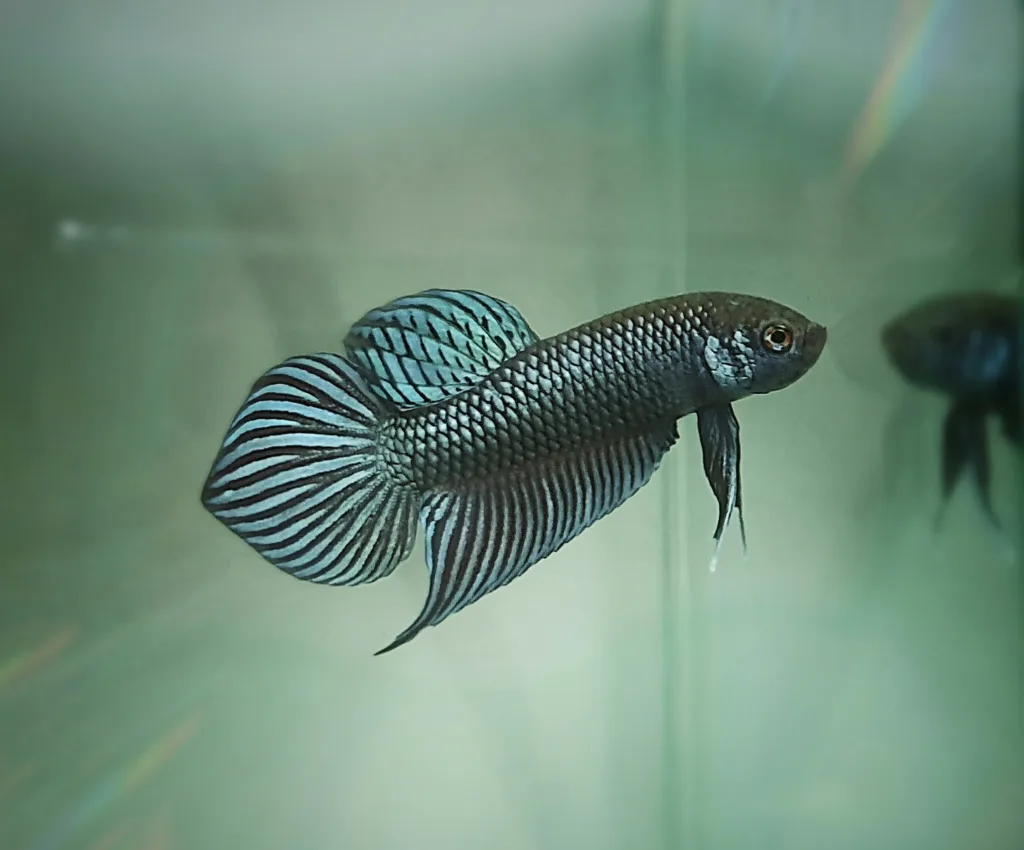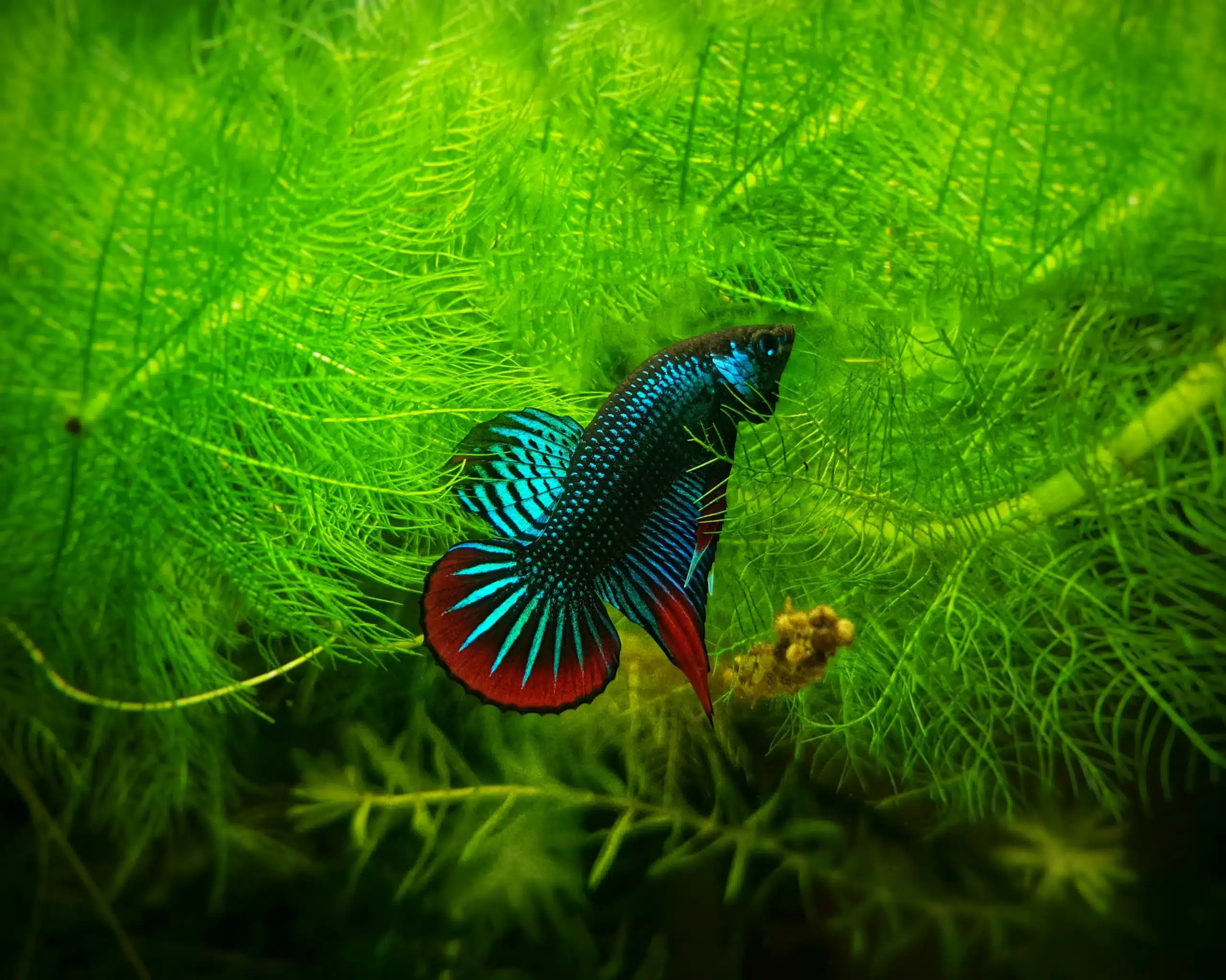Hey there! I’m glad you stopped by. If you’ve got a betta fish or are considering welcoming one into your home, you’re in for a treat. Betta fish are not just beautiful; they have some pretty unique habits, especially when catching some sleep. So, let’s tackle a burning question many betta owners have: How long do betta fish sleep?
Betta fish generally need about 12-14 hours of sleep daily, but they don’t do it all in one go. Instead, they take multiple short naps throughout the 24 hours. Yep, your betta is grabbing quick power naps here and there, day and night.
Now, you might be scratching your head, wondering if it’s normal for a fish to sleep that much or wondering what might affect their sleep patterns. Don’t worry; we’ll discuss all that and more. By the end, you’ll be a betta sleep expert, ready to ensure your aquatic buddy has the dreamiest slumber setup.
How Long Do Betta Fish Sleep?
Betta fish, much like humans, have a regular sleep cycle. However, unlike us, they don’t have eyelids to close when they sleep, so it is tricky to tell if they’re sleeping or just taking a slow moment. Generally, betta fish take short naps throughout the day and rest longer when it’s dark. This pattern aligns with their instinct to stay alert for predators and forage for food during daylight hours.
Sleep Duration
So, how long do betta fish sleep? A betta fish can sleep anywhere from 12 to 14 hours Daily. This sleep usually happens at night when the tank is dark. During the day, don’t be surprised if you see your betta taking quick naps here and there, especially if it’s found a cozy spot among the plants or decorations in its tank.
Day vs. Night Sleep Habits
Bettas are primarily diurnal, meaning they’re active during the day and rest at night. Their daytime naps are usually brief and can be quickly interrupted by sudden movements or light changes. At night, however, they seek a comfortable, secluded spot in the tank to rest uninterrupted.
How to Tell If Your Betta Is Sleeping
Since bettas can’t close their eyes, look for other signs that they’re catching some Z’s. A sleeping betta might lay on the bottom of the tank, rest on a leaf, or even float at the surface in a more relaxed, less colorful state. They’ll also respond slower to external stimuli, like the tapping on the glass or the sudden illumination of their tank lights.
Understanding your betta’s sleep needs and patterns is essential for their overall well-being. A regular, dark, and quiet sleep environment helps keep your betta healthy, happy, and vibrant. So, the next time you catch your betta lying still, chances are they’re just recharging their batteries, dreaming of wide-open waters and plentiful feasts.

Is It Normal for My Betta Fish to Sleep a Lot?
Have you noticed your betta fish spending more time napping than usual? If you’re starting to wonder whether your aquatic pal is becoming a sleepyhead, let’s shed some light on what’s normal and what might cause concern.
Bettas will sleep 6 to 8 hours at night and might take several short naps during the day. If your betta is within this range, there’s likely nothing to worry about.
If you notice that your betta is sleeping significantly more than this—especially if it’s sluggish during its awake periods or shows little interest in its surroundings—it might be time to pay closer attention. Excessive sleep can sometimes indicate stress, poor water quality, or health issues.
Signs of Normal Sleep
Here’s how you can tell if your betta’s sleep is on the healthy side of normal:
- They choose specific, comfortable spots for their naps.
- They wake up and become active when you approach the tank, or it’s feeding time.
- Their color remains vibrant, and their fins are fully extended when awake.
Indicators of Potential Issues
On the flip side, here are some red flags that might indicate a problem:
- Your betta is lethargic and unresponsive during their awake periods.
- They have trouble swimming or maintaining buoyancy.
- Their color is dull, or they show signs of fin damage or disease.

What Factors Can Affect Betta Fish Sleep?
Like us, betta fish can have their sleep affected by various environmental and physiological factors. Understanding these can help create the ideal conditions for your friend’s restful slumber. Let’s explore what influences betta fish sleep and how you can manage these factors.
Water Quality and Temperature
The foundation of a healthy aquarium environment starts with the water. Betta fish are particularly sensitive to water quality and temperature changes, which can significantly impact their sleep patterns.
- Temperature: Betta fish thrive in water temperatures between 76 to 80 degrees Fahrenheit. They can become lethargic and sleep more if the water is too cold. Conversely, if it’s too warm, it may increase their metabolism, leading to stress and less sleep.
- Quality: Ammonia, nitrite, and nitrate levels, along with the pH of the water, should be carefully monitored. Poor water quality can stress your betta, leading to health issues and disturbed sleep.
Tank Environment
The setup and condition of your betta’s tank play a crucial role in their well-being and sleep health.
- Size and Space: Betta fish need adequate space to explore and exercise during the day, which helps them sleep better at night. A tank that’s too small can cause stress, which can affect their sleep.
- Hiding Spots: Providing plants (real or silk), caves, and other hiding places mimics the natural environment of betta fish, offering them a sense of security and places to rest.
- Lighting: It is vital to maintain a consistent day-night cycle in your aquarium. Betta fish rely on these cues for their sleep cycle, so irregular lighting can disrupt their natural rhythm.
Diet and Nutrition
What and how you feed your betta fish can influence their sleep. A balanced diet ensures they have the energy they need during the day and can rest well at night.
- Quality of Food: High-quality, betta-specific food contains the proper nutrients to keep your fish healthy and active.
- Feeding Schedule: Giving too much food can cause health problems, and not enough can stress your betta. Both of these situations can mess with their sleep. It’s essential to get the feeding amount just right.
Health and Stress
Physical health and emotional well-being are deeply connected in betta fish, influencing their sleep quality.
- Common Health Issues: Diseases can make resting uncomfortable or difficult for your betta. If you notice changes in sleep and physical symptoms, it might be time for a vet visit.
- Stress Factors: Changes in the environment, aggressive tank mates, or poor water conditions can stress your betta, affecting its ability to sleep. Minimizing these stressors is essential for the health of your fish.
By understanding and managing these factors, you can ensure your betta fish enjoys the comfortable and restful sleep it needs. Creating an optimal environment for your betta doesn’t just help it sleep better; it also enhances its overall quality of life, ensuring that it remains a vibrant and energetic companion.
Conclusion
Understanding betta fish’s sleep needs is essential in caring for them. A restful environment is vital to their health and happiness. We can ensure they thrive by monitoring their sleep patterns and adjusting their habitat accordingly. Remember, a healthy betta is a happy betta, and their well-being is in our hands. Let’s provide them with the peaceful, comfortable conditions they need to enjoy both their active days and restful nights.
